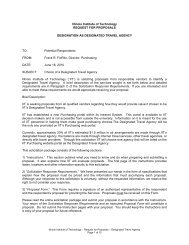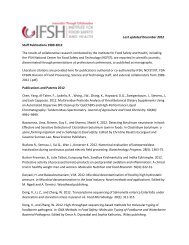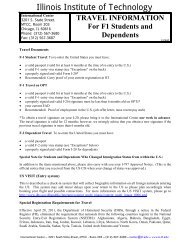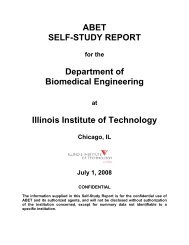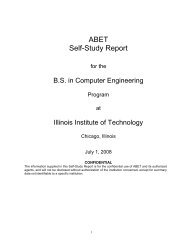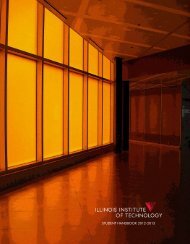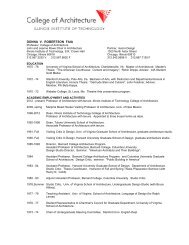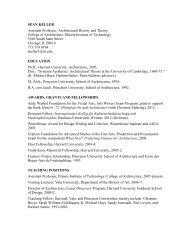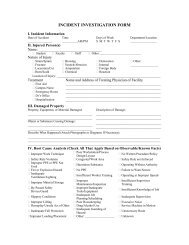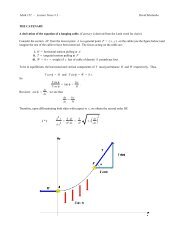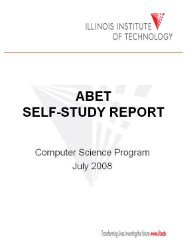Undergraduate Bulletin - Illinois Institute of Technology
Undergraduate Bulletin - Illinois Institute of Technology
Undergraduate Bulletin - Illinois Institute of Technology
Create successful ePaper yourself
Turn your PDF publications into a flip-book with our unique Google optimized e-Paper software.
Course Descriptions<br />
BME 330<br />
Analysis <strong>of</strong> Biosignals & Systems<br />
This course is a junior level introduction to the theoretical<br />
and practical aspects <strong>of</strong> signal processing and dynamic<br />
systems behavior as they relate to physiological, biological,<br />
and biomedical systems. The topics covered will include<br />
sampling theory, continuous and discrete Fourier transforms<br />
and series, Laplace transforms, Linear systems theory, signal<br />
filtering, models <strong>of</strong> biological and physiological systems, and<br />
analysis <strong>of</strong> dynamic and feedback systems. Open only to<br />
Biomedical Engineering majors.<br />
Prerequisite(s): [(BME 200, ENVE 426*, and MATH 252)]<br />
An asterisk (*) designates a course which may be taken<br />
concurrently.<br />
(3-0-3)<br />
BME 331<br />
Modeling & Control <strong>of</strong> Biological Systems<br />
The course expands upon the systems and signal processing<br />
concepts introduced in BME 330 to develop the tools to<br />
model physiological processes and the feedback control <strong>of</strong><br />
these processes.<br />
Prerequisite(s): [(BME 330) OR (ECE 308)]<br />
(3-0-3)<br />
BME 335<br />
Thermodynamics <strong>of</strong> Living Systems<br />
Principles <strong>of</strong> thermodynamics and conservation <strong>of</strong> mass<br />
applied to living systems and biomedical devices. The first<br />
and second laws <strong>of</strong> thermodynamics, pHs and chemical<br />
equilibrium, metabolic stoichiometry and energetics.<br />
Prerequisite(s): [(BME 320*, CHE 202, and MATH 251)]<br />
An asterisk (*) designates a course which may be taken<br />
concurrently.<br />
(3-0-3)<br />
BME 405<br />
Physiology Laboratory<br />
A laboratory course which demonstrates basic concepts<br />
<strong>of</strong> bioengineering design through experimental procedures<br />
involving humans and experimental animals. Statistical<br />
principles <strong>of</strong> experimental design. Study <strong>of</strong> possible errors.<br />
Experiments include nerve action, electrocardiography, mechanics<br />
<strong>of</strong> muscle, membranes, and noninvasive diagnostics in<br />
humans. Open only to Biomedical Engineering majors. Open<br />
only to Biomedical Engineering majors.<br />
Prerequisite(s): [(BME 315)]<br />
(1-3-2) (C)<br />
BME 410<br />
Transport Phenomena in Living Systems<br />
Convective and diffusive movement and reaction <strong>of</strong> molecules<br />
in biological systems. Kinetics <strong>of</strong> homogeneous and heterogeneous<br />
reactions in biological environments. Mechanisms and<br />
models <strong>of</strong> transport across membranes. Convective diffusion<br />
with and without chemical reaction.<br />
Prerequisite(s): [(BME 301 and MATH 252)]<br />
(3-0-3)<br />
BME 415<br />
Concepts <strong>of</strong> Neural Engineering<br />
Introduction to the fundamentals and principles <strong>of</strong> neural<br />
engineering. Emphasis is placed on pathological conditions<br />
that motivate the engineering design and clinical use <strong>of</strong> neural<br />
prosthetic devices. Pacemakers, FES stimulators, as well<br />
as CNS devices are examined, including extracorporeal and<br />
implantable systems.<br />
Prerequisite(s): [(BME 315)] AND [(ECE 211) OR (ECE<br />
215)]<br />
(3-0-3) (C)<br />
BME 418<br />
Reaction Kinetics for BME<br />
This course focuses on analysis <strong>of</strong> rate data and single and<br />
multiple reaction schemes. Biomedical topics include biological<br />
systems, enzymatic pathways, enzyme and receptor-ligand<br />
kinetics, pharmacokinetics, heterogeneous reactions, microbial<br />
cell growth and product formation, and the design and<br />
analysis <strong>of</strong> biological reactors.<br />
Corequisite(s): (BME 482)<br />
Prerequisite(s): [(BME 301, BME 335, and MATH 252)]<br />
(3-0-3)<br />
BME 419<br />
Introduction to Design Concepts in Biomedical Engineering<br />
Introduction to Design Concepts in Biomedical Engineering.<br />
This course aims to educate students on project definition,<br />
and on the design, development and technology transfer <strong>of</strong><br />
potential biomedical products in the context <strong>of</strong> the student’s<br />
major capstone project. Students will learn best practices<br />
for designing a marketable medical device, including the<br />
design process from the clinical problem definition through<br />
prototype and clinical testing to market readiness. Open only<br />
to Biomedical Engineering majors. Requires senior standing.<br />
Prerequisite(s): [(BME 315, BME 320, and BME 330)]<br />
(2-0-2) (C)<br />
BME 420<br />
Design Concepts in Biomedical Engineering<br />
An introduction to the strategies and fundamental bioengineering<br />
design criteria behind the development <strong>of</strong> biomedical<br />
engineering systems and implantable devices that use either<br />
synthetic materials or hybrid (biological-synthetic)systems.<br />
Analysis and design <strong>of</strong> replacements for the heart, kidneys,<br />
and lungs. Specification and realization <strong>of</strong> structures for<br />
artificial organ systems. Students will be required to complete<br />
a team-oriented design project in their chosen track.<br />
Prerequisite(s): [(BME 419)]<br />
(3-0-3) (C)<br />
BME 422<br />
Mathematical Methods for Biomedical Engineers<br />
This course integrates mathematical and computational tools<br />
that address directly the needs <strong>of</strong> biomedical engineers. The<br />
topics covered include the mathematics <strong>of</strong> diffusion, pharmacokinetic<br />
models, biological fluid mechanics, and biosignal<br />
representations and analysis. The use <strong>of</strong> MATLAB will be<br />
emphasized for numerically solving problems <strong>of</strong> practical<br />
relevance.<br />
Prerequisite(s): [(BME 330 and MATH 252)]<br />
(3-0-3)<br />
BME 423<br />
Cell Biomechanics: Principles & Biological Processes<br />
This course will provide students an opportunity to learn<br />
about mechanical forces that develop in the human body and<br />
how they can influence cell functions in a range <strong>of</strong> biological<br />
processes from embryogenesis, wound healing, and regenerative<br />
medicine to pathological conditions such as cancer<br />
invasion. Examples <strong>of</strong> research methods for investigating cell<br />
biomechanics in various biological systems will be discussed.<br />
Prerequisite(s): [(BME 301)]<br />
(3-0-3)<br />
BME 424<br />
Quantitative Aspects <strong>of</strong> Cell andTissue Engineering<br />
This course is designed to cover fundamentals <strong>of</strong> cell and<br />
tissue engineering from a quantitative perspective. Topics<br />
addressed include elements <strong>of</strong> tissue development, cell growth<br />
and differentiation, cell adhesion, migration, molecular and<br />
cellular transport in tissues and polymeric hydrogels for tissue<br />
engineering and drug delivery applications.<br />
Prerequisite(s): [(BME 418 and BME 482)]<br />
(3-0-3)<br />
192



